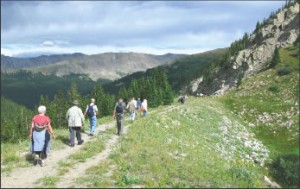At this moment I have nearly 2,000 strangers spending the night in my neighborhood.
Participants in the Ride the Rockies bike tour are camped out in tents, RVs, pickup beds, vans, and on the floor of the high school field house, about two blocks from my home/office. Today they rode over the Continental Divide from Gunnison, about 65 miles. Tomorrow they rise early and pedal 60 miles to Leadville. By Friday they are back in Glenwood Springs, having completed a loop of 380 miles in six days.
The amount of physical support for this Denver Post- sponsored event is astonishing. I counted three semi trailers just for provisions and gear. Then there are the rider support vehicles, the porta-potties, refreshment stands, mechanics, relatives, sponsors … you get the picture. Anyway, by tomorrow afternoon, they will all have gone, just in time for the participants and visitors for Salida’s big whitewater festival, FIBArk, to begin showing up – kayaks and canoes strapped on their vehicles, ready to play.
Locals, for the most part, are excited – new faces in town, fun events, and, hopefully, ringing cash registers. Salida is not immune to the current economic mess, but when you start out with an economy that is generally tight anyway, you don’t seem to notice the downturns as much; they just seem like a part of the cycle. Hopefully our out-of-town guests will help us to pay our bills for a while.
In light of Ed Quillen’s column this month on twittering, it is interesting to note that, with the recent upheaval in Iran, along with the crackdown on media outlets, the social network Twitter became one of the few outlets for Iranian citizens to reveal to the world their circumstances. Camera crews were barred, radio and television signals jammed by the government, even internet hosts and providers threatened and their bandwidth limited.
During the 1989 Chinese protests in Tiananmen Square, it was FAX machines which enabled the dissidents to communicate to the rest of the world what was happening day by day as the government enacted a crackdown on the media, barring news cameras and reporters from the scenes of the protests.
It may have been easier for tyrants and dictators to control the masses before electronic communications, and there will always be attempts to limit or eliminate the crucial dissemination of information during times of upheaval. But if anything has come of the digital age in the 21st century, it is that mass censorship becomes more difficult with every new innovation when combined with people’s desire for freedom from oppression.
Mike Rosso – June 2009



